
Heaven 17 are an English synth-pop band formed in Sheffield in 1980. The band were a trio for most of their career, composed of founding Human League members Martyn Ware and Ian Craig Marsh (keyboards) with vocalist Glenn Gregory.

The Human League are an English synth-pop band formed in Sheffield in 1977. Initially an experimental electronic outfit, the group signed to Virgin Records in 1979 and later attained widespread commercial success with their third album Dare in 1981 after restructuring their lineup. The album contained four hit singles, including the UK/US number one hit "Don't You Want Me". The band received the Brit Award for Best British Breakthrough Act in 1982. Further hits followed throughout the 1980s and into the 1990s, including "Mirror Man", "(Keep Feeling) Fascination", "The Lebanon", "Human" and "Tell Me When".

Clock DVA are a musical group from Sheffield, England, whose style has touched on industrial, post-punk, and EBM. They formed in 1978 by Adi Newton and Steven "Judd" Turner. Along with contemporaries Heaven 17, Clock DVA's name was inspired by the Russian-influenced Nadsat language of Anthony Burgess's novel A Clockwork Orange. Dva is Russian for "two".

Philip Oakey is an English musician who is the lead singer, songwriter, and co-founder of the synth-pop band the Human League. Aside from the Human League, he has enjoyed an extensive solo music career and has collaborated with numerous other artists and producers.

Penthouse and Pavement is the debut studio album by English synth-pop band Heaven 17, released in September 1981 by Virgin Records.
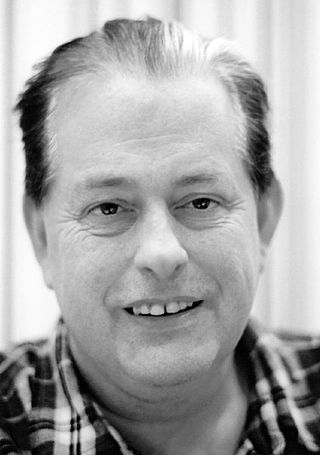
Martyn Ware is an English musician, composer, arranger, record producer, and music programmer. As a founding member of both the Human League and Heaven 17, Ware co-wrote hit songs such as "Being Boiled" and "Temptation".

Glenn Peter Gregory is a British singer, songwriter and multi-instrumentalist whose music career spans more than 40 years. He came to prominence in the early 1980s as co-founder and lead singer of the new wave and synth-pop band Heaven 17, which released several UK chart hits in the 1980s and 1990s, including “Temptation”, “Let Me Go”, “Come Live with Me”, “Crushed by the Wheels of Industry”, “Sunset Now”, “This Is Mine”, and “(We Don't Need This) Fascist Groove Thang”

The Luxury Gap is the second studio album by English synth-pop band Heaven 17, released on 25 April 1983 by Virgin Records. It is the band's best-selling studio album, peaking at number 4 on the UK Albums Chart – eventually becoming the 17th best-selling album of the year – and being certified platinum by the BPI in 1984.
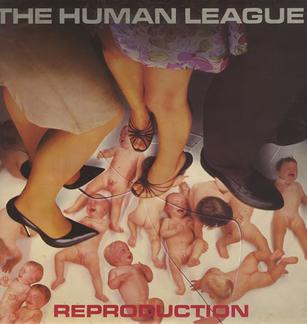
Reproduction is the debut studio album released by British synth-pop group The Human League. The album was released in 1979 through Virgin Records.

"Temptation" is a single by British band Heaven 17 featuring Carol Kenyon, originally released in April 1983 by Virgin Records, peaking at number two on the UK Singles Chart. This was the second single to be taken from their second album, The Luxury Gap (1983), after "Let Me Go" in November 1982. It was written by Glenn Gregory, Ian Craig Marsh and Martyn Ware, and produced by B.E.F. and Greg Walsh. The music video for the song was directed by Steve Barron. "Temptation" was certified silver by the BPI in May 1983, for sales exceeding 250,000 copies, subsequently listed by the Official Charts Company as the 34th best-selling single of 1983 in the UK.

"Being Boiled" is the debut single by the British synth-pop band the Human League. Composed by Martyn Ware and Ian Craig Marsh, with lyrics by Philip Oakey, it is regarded as a seminal work in early synth-pop.

The Golden Hour of the Future is a compilation album of recordings made by the electronic band the Future and early recordings by the original line-up of the Human League.

Before After is the seventh studio album by the English synth-pop band Heaven 17. It was originally released in September 2005, on the label Ninthwave, nine years after their previous album, Bigger Than America.

Vice Versa are an electronic band that formed in Sheffield, England, in 1977. Vice Versa originally consisted of Stephen Singleton, Mark White, Ian Garth, and David Sydenham, the former two of whom would go on to later found the successful 1980s pop band ABC. The band was active from 1977 to 1980 with the aforementioned line-up, and reformed in 2015 without Garth and Sydenham. Vice Versa are considered one of the "Big Four" late-1970s minimalistic electronic/synth-based bands from Sheffield. They share this title with Cabaret Voltaire, Clock DVA and the Human League.
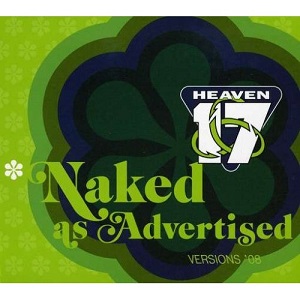
Naked as Advertised is the eighth studio album by the English synth-pop band Heaven 17. It was originally released in 2008, on the label Just Music, three years after their previous album, Before After. The album contained re-workings of tracks such as "Temptation" along with versions of Martyn Ware songs best known from his time with the Human League, including "Being Boiled" and "Empire State Human", as well as a cover of The Associates' hit "Party Fears Two". Following the departure of Ian Craig Marsh in 2007, this is the first Heaven 17 album with the band consisting of the duo of Glenn Gregory and Ware.

"Come Live With Me" is a song by the British synthpop band Heaven 17, which was released in 1983 as the fourth single from their second album The Luxury Gap. It was written by Glenn Gregory, Ian Craig Marsh and Martyn Ware, and produced by Marsh and Ware and Greg Walsh. "Come Live with Me" peaked at number 5 in the UK Singles Chart and remained in the top 100 for eleven weeks. It would be the band's last UK top 10 hit until the Brothers in Rhythm remix of "Temptation" in 1992.
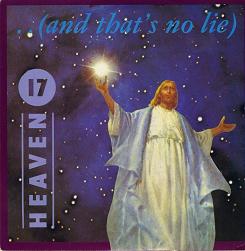
"...(And That's No Lie)" is a song by the British new wave and synth-pop band Heaven 17, released on 7 January 1985 as the third single from their third studio album, How Men Are (1984). The song was written by Glenn Gregory, Ian Craig Marsh and Martyn Ware, and produced by Ware and Greg Walsh. It reached number 52 in the UK Singles Chart and remained in the top 100 for five weeks. A music video was filmed to promote the single.
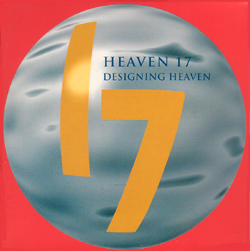
"Designing Heaven" is a song by the British new wave and synth-pop band Heaven 17, released in 1996 as the lead single from their sixth studio album, Bigger Than America. It was written by band members Glenn Gregory, Ian Craig Marsh and Martyn Ware, and was produced by Marsh and Ware under their production company British Electric Foundation. The song peaked at number 128 in the UK Singles Chart. It was the band's first release of new material since 1988.

Music for Stowaways is the debut album by English electronic act British Electric Foundation (B.E.F.), formed by musicians Martyn Ware and Ian Craig Marsh. The album released in the United Kingdom as a limited edition cassette in March 1981 by Virgin Records, who also released an LP version of the album titled Music for Listening To later in the year with a different track list and cover art, aiming its release for export markets. The Stowaways version was originally released concurrently with Ware and Marsh's first single with Heaven 17, "(We Don't Need This) Fascist Groove Thang", itself a developed version of the Music for Stowaways track "Groove Thang".
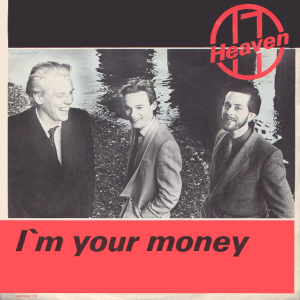
"I'm Your Money" is a song by English new wave and synth-pop band Heaven 17, released in 1981 by Virgin as a non-album single. The song was written by band members Ian Craig Marsh, Martyn Ware and Glenn Gregory, and produced by B.E.F..



















